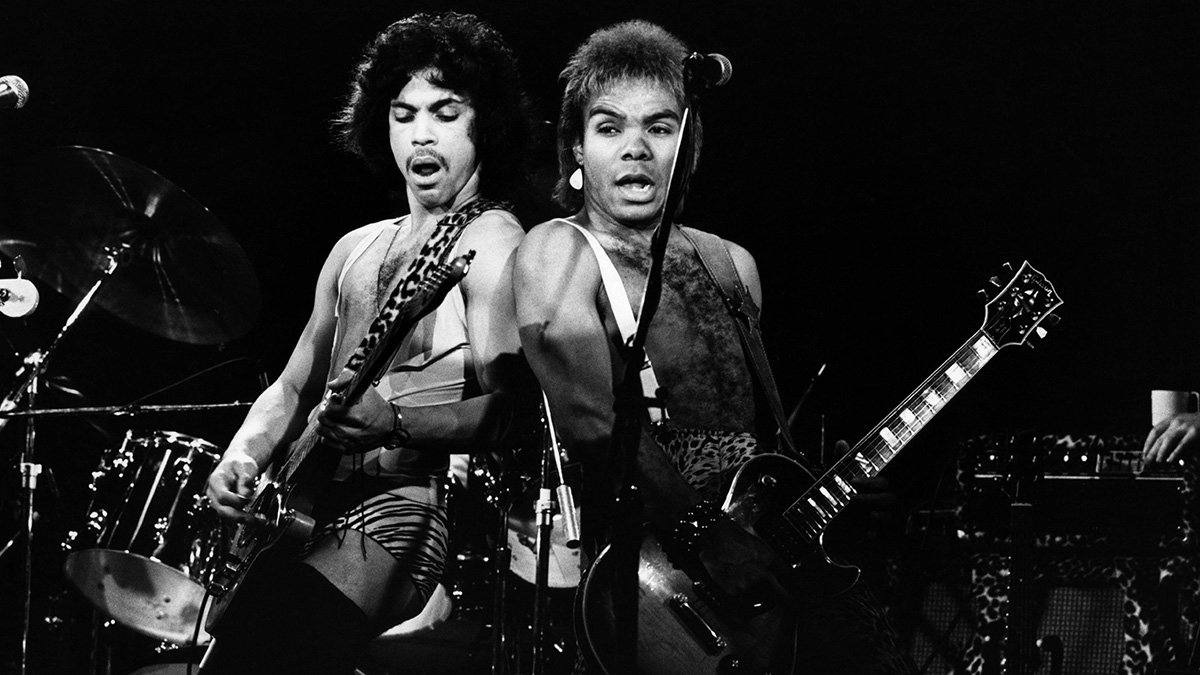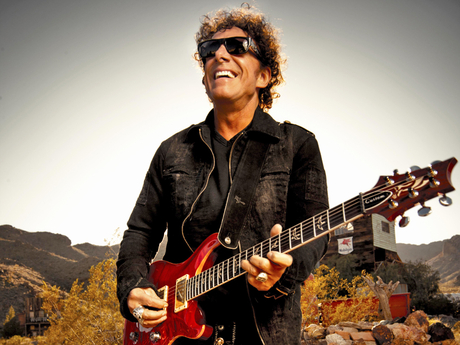
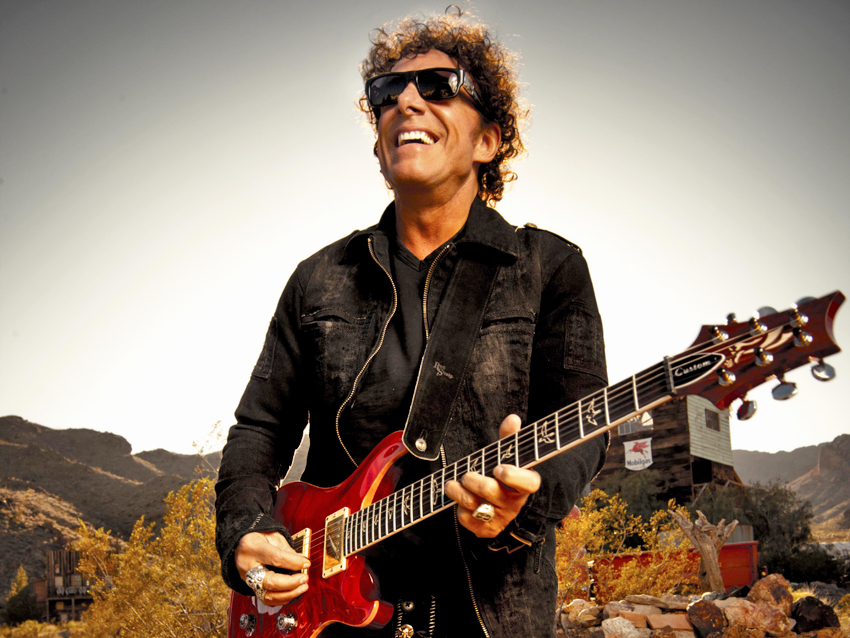
Neal Schon played mostly Paul Reed Smith guitars on Journey's new album, Eclipse. © Travis Shinn
"I don't feel like a guitar hero," says Journey's Neal Schon. "It's flattering when people say nice things about what I do, but really, I'm just another guitar player. There's so many guys who are much better than me. That's not false modesty - it's the truth. In the end, it all comes down to trying to express yourself. If you can establish a signature sound or style, that's a major feat. I've been at this a long time, so hopefully I've accomplished those things."
Since founding Journey in 1973 (this after joining Santana at the tender age of 15!), Schon, whose tenure in the band has been a constant, despite what has sometimes appeared to be a revolving door of members, has done more than carve out a recognizable guitar sound. He's created a rich catalogue of songs that - pardon the cliche, but it's entirely fitting here - have become part of the soundtrack of millions of people's lives across the globe. From proms to weddings to even funerals, Journey songs have played a prominent role.
And as for pop culture, screw the critics, who have hurled brickbats at the group since Day One. That Sopranos finale, the last scene? Fuggedaboudit - unthinkable without Don't Stop Believin' playing on the jukebox. Game, set match - Journey won the title of Coolest Band Around without even setting foot on the court.
But here we are in 2011, and Journey (which also includes longtime members Jonathan Cain on keyboards, bassist Ross Valory and drummer Deen Castronovo, along with 2007 YouTube recruit, the Filipino-born singer Arnel Pineda who has tackled the unenviable task of replacing vocalist Steve Perry) have just released Eclipse, their most musically diverse and challenging album since 1983's Frontiers.
There's hooks a-plenty on Eclipse (a joint production between Kevin Shirley, Schon and Cain), and yes, there's a couple of unabashed love tunes, but much of the time the group flips the bird at their reputation as 'sensitive, power-balladeers,' dishing out muscular, complex cuts that routinely clock in at well over the five-minute mark.
Which suits Schon just fine. "Eclipse is a Catch-22," he says. "Most people really love it. Occasionally, I'll hear a snide remark: 'Oh, they should've stuck to the formula. With a song like Don't Stop Believin' being bigger than ever, where's one of those?' But that's the thing: We've already done that song. We've got a ton of those songs. I don't feel like sitting in neutral. Right now, there's pretty much nothing we can't do. We're going for it."
Get the MusicRadar Newsletter
Want all the hottest music and gear news, reviews, deals, features and more, direct to your inbox? Sign up here.
Gearing up for a two-year world tour in support of Eclipse, Neal Schon sat down with MusicRadar to discuss the new album and the state of Journey, which he calls a "very happy, very together unit." In addition, we chatted guitars and gear and strolled down memory lane to talk about the one song that, in Schon's words, "just doesn't go away." Not that he's complaining.
Once again, you worked with Kevin Shirley, who is known for his speedy manner in the studio. Does that kind of rapid pace inspire you?
"Not particularly. Kevin is quick, and I'll be honest, he was a little too quick with me. We don't take forever in the studio; we don't waste time. But I don't like to be rushed. Put it this way: I'd rather spend my days playing in the studio instead of having somebody Pro Tool.
"Actually, the record is co-produced by Kevin, Jonathan and myself. After Kevin split and went to work with Joe Bonamassa, I went in and redid things. I heard what we'd recorded, and I thought we weren't even close to being done. So I recut quite a few guitars and solos. Arnel sang practically the whole record over again. Then we did more keyboard overdubs and moved string parts around.
"We produced a lot of this record by ourselves. But I was very passionate about it and wanted it to be great, so I stuck with it till the very end. From the mixing to the sequencing, I put in a lot of work. In my opinion, when it was done, it was really done."
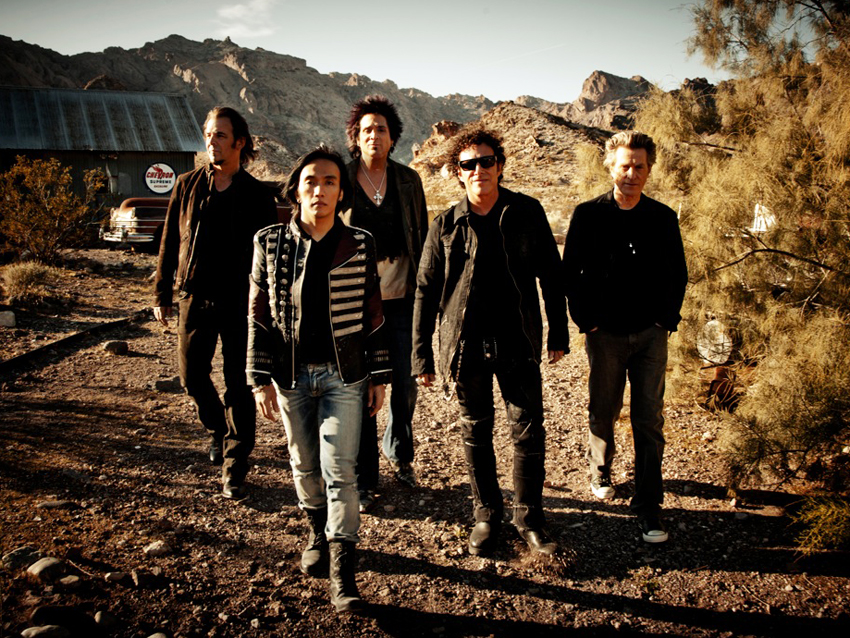
Eschewing perks like buses and planes, Journey (l to r: Jonathan Cain, Arnel Pineda, Deen Castronovo, Neal Schon and Ross Valory) walk to their gigs. © Travis Shinn
Joe Bonamassa recently said that he could always count on Kevin to give him the "brutal, honest truth." Is Kevin very blunt with you?
"Kevin has his opinions, but I have my opinions, too. And I'm known as Mr Subtle, which is basically brutal, too. [laughs] Kevin and I locked horns a lot of this record. I fought with him, sure, but it was because I didn't want to do a typical Journey record."
Last year, I spoke with Kevin, who said that there were "opposing forces in Journey." He claimed that "some members want it to be a heavy rock band, while others want to have big hit ballads."
[laughs] "Well, that's no secret to anyone. I like playing it all. But if I were given my choice, I'd pick eight rock songs and two power ballads. That's the way I've always been.
"Ever since Jonathan joined the band, he's tended to bring in the big ballads, and I bring the rock. What's different about this record is that I finally stood my ground and said, 'No. We're not doing the same fucking thing. I'm not interested in the same record over and over and over.' We have so many ways to go - grooves, cool tempos, heavier songs that aren't three minutes long. That's what I'm interested in exploring. I want to take some chances."
You say that Jonathan brings in the ballads, but yet you're both listed as co-writers on all the songs. In what ways do you two collaborate?
"It varies. With some songs, I'll bring in the full musical bed, but Jonathan will work on the lyrics. Then there's songs that Jon brings in and I'll rearrange them - change the bridges, put in a different solo section, a different outro. It goes all kinds of ways, but we definitely collaborate."
How do you know when you've written a 'classic rock' song? You've got a few under your belt. Do you just feel it right away, or are you surprised when a song does so well?
"That's a good question. You know, Don't Stop Believin', for example, which is the song that just keeps on giving, it just doesn't go away. It grows and grows. When we recorded it over 30 years ago, I thought, Wow, this feels like it could be big. But I thought the same thing about songs that didn't hit it. When you have a good song, you know it, but ultimately the public decides what's gonna stick around.
"We have some great songs on the new record, but it's more of a conceptual album. Our diehard fans will love it. It's made for them, it's built for the stage. Will radio play it? Hard to say. I don't know what radio is anymore. On the other hand, the first single, City Of Hope, that I edited down to three and a half minutes, is number three at rock radio, and it's supposed to go to number one this week.
"Kevin and I went around and around on the radio edits. He felt that a lot of the songs were too long, and after a while I had to tell him, 'Enough. You're not touchin' my shit anymore. If you do, the record will sound like all the other ones. I'm not interested in that.'"
On the subject of Don't Stop Believin', how does it feel to know that it's the number one downloaded song in iTunes history? Also, what did you think about the track being used for the last scene in The Sopranos?
"The most-downloaded song on iTunes - that's heavy! [laughs] When I first heard that, I didn't know if I should believe it. But it's true. The song gets bigger and bigger every day. It's amazing. The Sopranos thing was such a kick. To know that it was in the last scene of that show, again…pretty heavy. [laughs] When I was first told about it, I was like, 'No freakin' way!' But it happened, and it worked beautifully. You couldn't ask for a better slot in anything. Everybody called me right afterwards. It was pretty cool."
Let's get into some songs from the new album. City Of Hope has a very rousing top-string guitar intro. How long do you noodle around till you come up with something like that?
"I don't know, really. It's an arpeggio, and it sounds almost like a keyboard to me. I was just practicing, and I started playing that part. I can't do sweep-picking like Frank Gambale or all the stuff that Steve Vai does. But I listen to a lot of classical music, and I've always noticed that the string players do things like what I do in that intro. I try to practice to Bach, Beethoven, Mozart...just to get my dexterity down and not play the standard rock things everybody else plays.
"What I like about the intro is the groove. It doesn't just sound like scattered notes. There's a lot of guitar all over the song - not so much on the edited single version, but that's why we have the album version." [laughs]
Edge Of The Moment certainly has a lot of guitar on it. There's like nine different parts colliding. The intro, though, has the same kind of arpeggiated intro as City Of Hope.
"They're kind of like sister songs in that way. I came up with the intro riffs and got very attached to them; I didn't want to drop one because it sounded a little like the other. Actually, when I went to sequence the record, the two songs sounded really right close together. I like the fact that the album starts out non-commercial. It takes you on a bit of a ride, and then some of the more commercial tunes come in. Before that happens, you've already given people something fresh and gotten their interest."
There's some nice interplay between the guitar and keyboards on Human Feel. It sounds as though Jonathan's playing a Hammond B3. Were you trying to go for a classic British '70s rock vibe?
"I believe Jon played synths and organ - there's a few different sounds going on. I guess we were trying to get a classic British sound. With me, it all started with the drum beat. I'd found a beat on this rhythm machine years ago and held onto it. I keep a little recorder with me backstage, and if I do something or play something that intrigues me, I'll record it fast. Most of the time, I forget about all of these things, but in this case, I heard the drum beat again and I remembered what I liked about it. A riff popped into my head, and there you go."
To Whom It May Concern is a power ballad that features a stand-out guitar solo. When it comes time for you to grab that spotlight in the studio, how many passes do you need? Or is everything worked out beforehand?
"I don't usually work out solos in advance, no. I like to be surprised at what I come up with. I might hear something in my head before I lay something down, but I'm thinking of a melody or a theme. So I'm not thinking 'guitar solo' per se; I'm discovering the song's theme. When I have that in mind, I have a good starting point for a solo."
Several years ago, you found your current singer, Arnel, on YouTube. Did that feel strange to be surfing the web and looking for somebody to join a huge band like Journey?
"No, it didn't feel weird. We needed a singer, and I didn't want to go through the normal audition process where you get a package with a CD and a photo - but you don't really know what the guy might look like on stage; you don't know how he is at fronting a band. It's so time-consuming, opening hundreds of folders and popping in CDs, listening to half and song and going, 'Uh-uh… Next!' Believe me, you do this for a week straight and you're insane. So I didn't want to deal with that whole thing.
"I turned to YouTube because I liked the concept of watching raw footage and seeing guys on stage being totally real. Still, YouTube can be sort of an endless void. I looked up rock and soul singers, and after two days of not coming up with much - and believe me, I was at the point of giving up, like, 'Is there even a guy out there?' - I finally stumbled across a link to a video of Arnel singing a Survivor song. Out of frustration, I punched it, and suddenly, this guy's voice came out… 'Wow! Who is that?' [laughs] I followed the link back to Arnel's site, and there were all of these videos of him singing everything from AC/DC to Led Zeppelin to Journey to Sting to you name it. The guy did everything!
"I didn't believe it at first. I was like, 'No way. This guy can't be that good.' I went out and took a motorcycle ride and came back to the computer and watched him again. 'Goddammit, the guy really is that good! He's for real.' [laughs] It was amazing.
"I'm glad I had YouTube as a means for discovering him. Actually tracking him down and getting ahold of him in Manila in the Philippines was a major ordeal. And getting him out of the country was even harder. But we managed to put him on a flight to audition for us, and we were blown away. We worked with him for several days, and each day he sounded better and better. The guy's amazing. No one deserves this gig like Arnel. He's so talented and is such a nice person. We've become great friends."
What about the interview he gave to Rolling Stone a couple of years ago in which he apparently said how unhappy and disillusioned he was on tour? Was that really the case, or were his comments taken out of context, as he and the band quickly tried to clarify?
"Here's the deal, it's journalism, you know? He's not used to American journalism, and especially anybody from Rolling Stone. [laughs] You're a journalist, so hopefully you know what I'm talking about. What he said and how he meant it and the way they took it were totally different things. He wasn't used to being on tour, he was very tired… We definitely put him to the test on the road, no doubt. But if he were unhappy, he would've been gone by now. Or he would've left the tour right then and there - we didn't have anything other than a handshake deal with him."
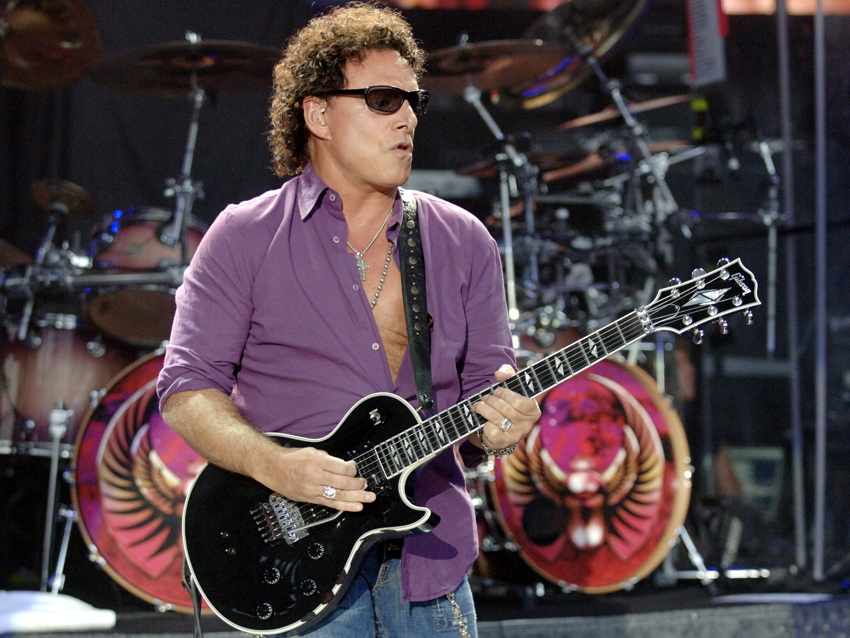
Schon during his Gibson days, on stage in California, 2006. © Tim Mosenfelder/Corbis
So everything's fine with Arnel and the band? He's fully integrated?
"He's here. He's 100 percent. I couldn't see doing this thing without him now."
Let's talk gear. What did you use on the new album?
"My guitar sound has always consisted of one straight amplifier with no effects on it, and another with a stereo echo sound. That's it, really. I can play completely dry if I'm playing the blues, but that sound doesn't really fit Journey. I like a good amount of slapback echo, in which case I'll use a little taste of a harmonizer or a chorus.
"But I'll tell you something. Lately - and I think they sound amazing in the studio and on this record - I've been using the Fractal Axe-Fx. The thing's amazing! I'm so blown away by this unit and the guys who built it. Vai uses it, Steve Stevens uses it, Dweezil Zappa… I saw Dweezil on TV the other night, and he had the most incredible guitar sound coming through a TV speaker, and I looked at what he was using and it was the Fractal. I'm working with the people in the company, and I can't say enough good things about them.
"Live, I do use a real amp, a Blackstar Series One 100-watt head, which goes direct as a stereo send into the PA. I record with the Blackstar and a 4x12 cabinet - we use a couple of different mics on that. That's pretty much it, the Blackstar, the Fractal and a wah-wah in front of it."
You've used a variety of guitars over the years, but mostly I've seen you play Les Pauls -
"I did not play one Les Paul on this new record. I played Paul Reed Smith guitars - I'm working with them again, and we've got some great stuff coming out. I also played some Fender customs models. The Paul Reeds were singlecuts that Paul made for me about 10 years ago. Then I played a couple of McCartys that were custom-made for me, as well. And I had an old Schon guitar that Fernandes made - actually, they're going to start building them now, which is cool. Then there were some custom Fender Strats and Teles - mahogany, neck-thru, neck and body, chambered bodies, curly maple tops."
But no Les Pauls?
"Nope. They rubbed me wrong, man. I worked very hard with them on my signature model that we did several years ago, and we got Les' blessing and everything - Les was a good friend of mine. We changed the heel on the guitar, changed the angle of the neck, showed them how you put a Floyd Rose in a Les Paul without the thing sticking five miles out. We did a lot. And they ended up telling me that my guitars wouldn't sell because they were too expensive, even though every one of them sold out - this, despite the fact that they put some ridiculous price tag on them, like $10,000 or $12,000 a guitar.
"So they took my ideas and stuck them on the Axcess model, which is a cheaper edition of what was my guitar. We got into it legally for a moment about the heel of the guitar, which was very much like a Schon. Eventually I just said, 'I'm gonna let this go. Forget about it.' So I walked away, and I'm glad I did."
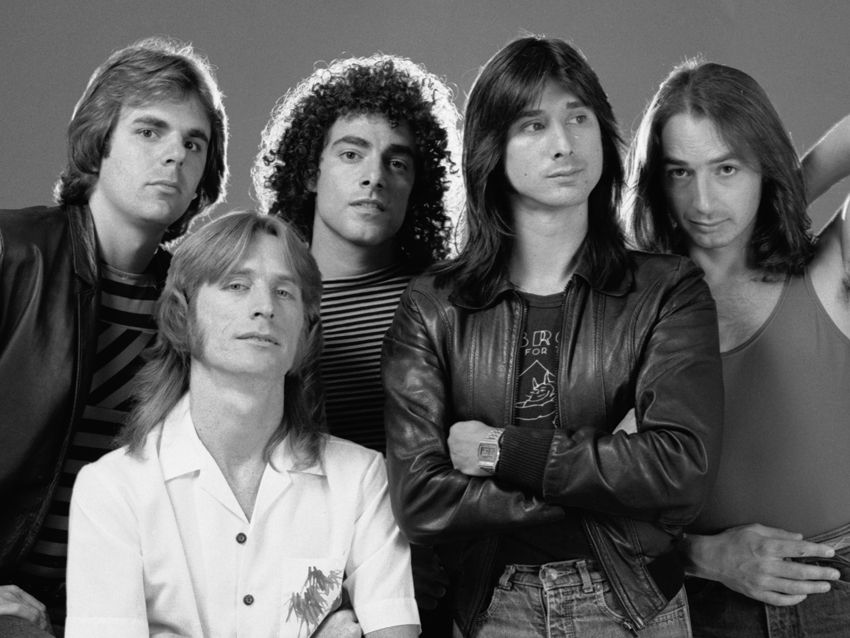
Journey in 1981, on top of the world and branded 'corporate rock.' From left to right, Cain, Valory, Schon, singer Steve Perry and drummer Steve Smith. © Roger Ressmeyer/CORBIS
I want to ask you about an episode in your early career. When you were quite young, you joined Santana...
"I was 15, yeah."
But at the same time you were being courted by Eric Clapton to join Derek And The Dominoes?
"Actually, I got the offer from Eric before I got asked to join the Santana band. What a choice, you know? [laughs] And the funny thing is, I was more from the school of Eric Clapton than I was of Carlos or Latin music. It was a heavy thing. I was in the studio with Carlos and the band, and we were jamming, and Eric walked in. 'Whoa!'…I was blown away, of course, and I didn't say too much. I don't think I knew what to say. But we ended up jamming, it was a fun time, and the next day I went back to the studio and there was a note from Eric's people requesting that I go and play with Eric that night at the Berkeley Community Theatre.
"I got a ride to the venue and arrived about 15 minutes before the band was supposed to go on, and they were all sleeping, nodded out in the back. I knew something was up, and it wasn't healthy. You know, I love Eric. He's a great guy, plays like only he can. Nobody can play like Eric Clapton. It's just…I think that was during a period when there were drug issues. Not that there weren't drugs in the Santana band, but it just didn't seem as radical to me at the time."
You seem like a pretty clean-living guy. I assume that drugs and alcohol have never been a problem for you.
"Well, that's where you're wrong! No man, I was there. I was…I was a functioning fuck-up. [laughs] A functioning alcoholic. I did coke and drugs for many, many years. I just never went down. I never got so sick where I couldn't play. During all the years I've been playing, I never missed a gig in my life. So I felt like that gave me the right to do anything I wanted. But after a while, you get older and your body starts talking to you - and you'd better listen. I never had an addictive personality; I just couldn't put the brakes on. I didn't just have a shot of tequila, I had the whole bottle. You can't keep doing that.
"Three years ago, I finally said, 'I'm done.' Never went to an AA meeting or anything, but I stopped everything. I've been completely sober, and I'll tell you, I feel great. I'm probably the healthiest I've ever been. People come up to me and tell me I look younger now than I did in the '80s, and that's great. I've got a lot of wonderful things in my life, and I should enjoy them without being numb all the time. I feel like I've missed out on a lot over the years by being, you know, numbed up."
Despite Journey's success, during the '80s you were called many things: corporate rock, a 'faceless' band and so on. Did that bother you, the fact that you couldn't get any love from the critics?
"I can't say it didn't bother me. Any time somebody takes a shot at you, no matter who it is, you take offense if you pay attention to it. Instead of going down the negative road and letting the critics get me down, I just went with our audience. I'd go out on stage and see packed arenas and stadiums, and I'd just say, 'Hey, it doesn't matter. These people are here, and they love what we do, so that's what's important.' I still feel that way.
"The bottom line is, the critics could never drag us down. They could never pigeonhole us, and that drove them crazy. But you know, critics get paid to write crap about you. I've been around long enough to understand that. It doesn't bother me like it used to. Like I said, I'll go with our audience."
Joe is a freelance journalist who has, over the past few decades, interviewed hundreds of guitarists for Guitar World, Guitar Player, MusicRadar and Classic Rock. He is also a former editor of Guitar World, contributing writer for Guitar Aficionado and VP of A&R for Island Records. He’s an enthusiastic guitarist, but he’s nowhere near the likes of the people he interviews. Surprisingly, his skills are more suited to the drums. If you need a drummer for your Beatles tribute band, look him up.
“They didn’t like Prince’s bikini underwear”: Prince’s support sets for the The Rolling Stones in 1981 are remembered as disastrous, but guitarist Dez Dickerson says that the the crowd reaction wasn’t as bad as people think
“We are so unencumbered and unbothered by these externally imposed rules or other people’s ideas for what music should be”: Blood Incantation on the making of Absolute Elsewhere and how “Data from Star Trek” saved the album – and the studio

